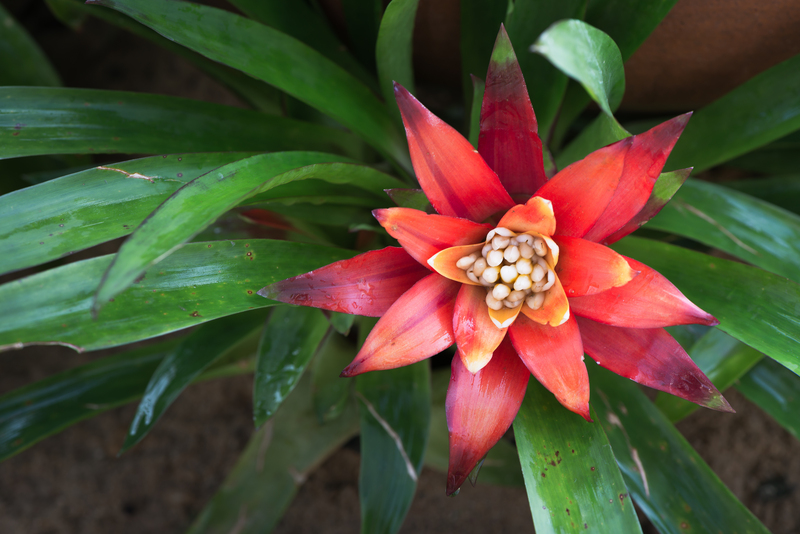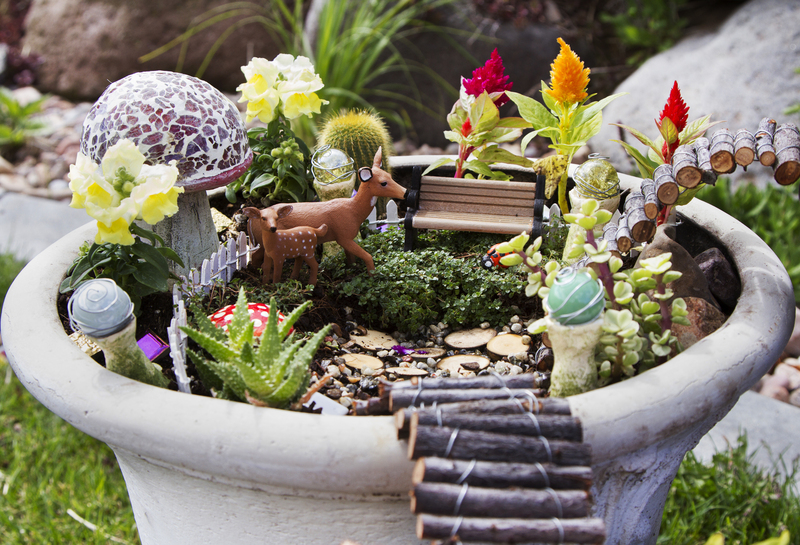Organic Debris to Fertile Grounds
Posted on 23/08/2025
Organic Debris to Fertile Grounds: Transforming Waste into Wealth
In today's environmentally conscious world, the conversation about sustainability and eco-friendly practices is more alive than ever. Among various approaches to sustainable living, the transformation of organic debris into fertile grounds stands out as one of the most practical and rewarding methods for households, community gardens, and large-scale agriculture alike. This comprehensive guide will walk you through the journey of how organic matter transforms from mere waste to rich, productive soil, effectively closing the loop in nature's cycle and enriching our planet.

Understanding Organic Debris
At its core, organic debris refers to natural materials that are left over after plants or animals have finished using them. This includes a wide variety of substances such as:
- Fallen leaves
- Fruit peels
- Grass clippings
- Branches and twigs
- Wood chips
- Kitchen food scraps
- Animal manure (from herbivores)
Why Convert Organic Waste into Fertile Soil?
Turning organic debris into fertile soil is not only environmentally sound but also beneficial for:
- Reducing landfill mass: Diverting organic material from landfills can help lower methane emissions, a potent greenhouse gas.
- Enriching soil health: Decomposed organic matter (humus) improves soil structure, water retention, and nutrient availability.
- Promoting biodiversity: Healthy soils support diverse fungi, bacteria, earthworms, and insects critical for ecosystem balance.
- Supporting sustainable agriculture: Fertile soils reduce dependence on chemical fertilizers and pesticides.
- Creating a closed-loop system: Utilizing garden and kitchen scraps ensures that nutrients are returned to their place of origin, completing nature's cycle.
Composting: The Primary Pathway from Debris to Soil
What is Composting?
Composting is a natural process that breaks down organic material, aided by bacteria, fungi, and other decomposers. These microorganisms transform waste into a dark, crumbly substance known as compost--your very own homemade fertilizer. This process is fundamental in turning organic debris into fertile ground.
Types of Composting Methods
- Backyard Composting: Traditional piles or bins for garden and kitchen scraps. Ideal for residential gardens.
- Vermicomposting: Uses worms (usually red wigglers) to speed up decomposition, resulting in highly nutritious worm castings.
- Bokashi Composting: A fermentation method using specific microbes. Effective for meat, dairy, and processed foods.
- Commercial/Industrial Composting: Large-scale facilities process municipal organic waste, converting it to commercial-grade compost.
How to Start Composting at Home
If you want to embark on the journey from organic debris to fertile soil, here is how you can start composting at home:
- Choose a compost bin or pile location. Pick a dry, shady spot near a water source for your compost pile or bin.
- Add green and brown materials:
- Green waste - kitchen scraps, coffee grounds, fresh grass clippings.
- Brown waste - dry leaves, paper, wood chips.
- Maintain proper moisture: The compost should be as damp as a wrung-out sponge.
- Turn the pile: Aerate your compost every few weeks to speed up decomposition and prevent odors.
- Patience and harvest: In 2-6 months, the result is dark, crumbly, earthy-smelling compost ready to enrich your grounds.
What Can and Cannot Be Composted?
Knowing which materials can be composted is essential in creating healthy, fertile ground:
- Can be composted: Vegetable peels, fruit scraps, eggshells, coffee grounds, tea bags, yard trimmings, dead plants, cardboard, paper.
- Should NOT be composted: Dairy, meat, oils, pet feces, diseased plants, glossy magazines, synthetic materials.
Common Challenges in Composting and Solutions
- Odor issues - often due to excess green material or too little aeration. Add more browns and turn the pile often.
- Pests - caused by improper composting of meats, oils or not covering food waste. Stick to recommended materials and use a bin with a lid.
- Slow decomposition - often due to lack of moisture or insufficient aeration. Adjust moisture and turn pile more frequently.
The Decomposition Process: Nature's Magic Chemists
The transformation of organic debris into fertile soil is orchestrated by an army of microorganisms and helpful critters:
- Bacteria: The first decomposers, breaking down soft tissues and simple compounds.
- Fungi: Attack tougher materials like cellulose and lignin, found in wood and leaves.
- Protozoa and nematodes: Feed on bacteria, releasing additional nutrients.
- Earthworms: Break down organic matter, aerate the soil, and leave behind nutrient-rich castings.
Benefits of Turning Organic Waste into Fertile Grounds
- Improved Soil Structure: Compost binds soil particles, enhancing aeration and drainage.
- Better Water Retention: Humus holds moisture in sandy soils and improves clay soils' texture.
- Balanced Nutrients: Organic compost steadily releases vital nutrients--nitrogen, phosphorus, potassium--feeding plants naturally.
- Enhanced Microbial Life: Fertile, compost-rich soils foster beneficial bacteria, fungi, and insects.
- Natural Disease Suppression: Healthy soils can help suppress plant diseases and pests, reducing the need for chemicals.
- Reduced Chemical Fertilizer Usage: By replenishing the soil organically, you reduce or eliminate the need for expensive and polluting chemical fertilizers.
Innovative Uses for Organic Debris in Landscape Design
Beyond forming compost, organic debris can play a direct and creative role in landscape design and soil fertility enhancement. Consider these approaches:
- Mulching: Shredded leaves, chips, and straw placed on top of soil help regulate temperature, retain water, and suppress weeds.
- Hugelkultur: This permaculture technique involves burying logs and woody debris beneath planting beds, slowly releasing nutrients as they decay.
- Sheet Composting: Also known as lasagna gardening, where layers of organic material are stacked directly onto growing areas and allowed to decompose in place.
- Worm Towers: Vertical structures embedded into garden beds where kitchen and garden waste are placed for worms to process directly underground.
Large-Scale and Commercial Applications
While home and community composting are powerful, the impact multiplies dramatically in commercial and agricultural settings. Many farms, cities, and institutions have implemented:
- Municipal composting programs - collecting yard and food waste from residences and businesses.
- On-farm composting - utilizing crop residues and animal manure for in-field fertilization.
- Green waste recycling centers - processing landscaping debris into mulch and compost for public use.
The Role of Technology in Organic Waste Management
Recent advancements have made it easier and more efficient to convert waste into fertile ground:
- Composting machines: Automated, odor-reducing units capable of rapidly processing tons of organic waste.
- Mobile apps: Help residents track and reduce waste, connect with local composting facilities, and share resources.
- Biogas plants: Convert food and yard waste into renewable energy alongside compost.
Organic Debris to Fertile Grounds: Best Practices for Success
- Diversify your inputs: Mix multiple types of organic material to ensure balanced nutrients and effective decomposition.
- Monitor and adjust: Regularly check temperature, moisture, and compost composition.
- Educate and involve: Teaching family, neighbors, or employees about composting multiplies impact.
- Support local policies: Participate in green waste programs or advocate for composting initiatives in your community.
- Utilize finished compost wisely: Apply around trees, shrubs, lawns, and garden beds for maximum benefit.

Myths and Misconceptions about Organic Waste
- "Composting is too hard." In reality, basic composting simply requires patience and awareness of what to add.
- "Compost piles always smell bad." When managed correctly, compost should smell earthy, not rotten.
- "It doesn't make a difference." Composting even a portion of household waste significantly reduces landfill use and supports plant health.
Conclusion: Building Fertile Grounds for the Future
Transforming organic debris into fertile grounds is more than just eco-friendly; it's essential for soil health, food security, and a sustainable planet. By embracing methods that convert organic waste into precious soil amendments, we not only close the natural loop but also enrich our environment for generations to come. Whether you are an individual gardener, a community group, or a large farm, the tools and knowledge to turn waste into wealth are within your reach.
Start composting, share your success, and watch your land transform from organic debris to fertile, thriving grounds--nature's way of rewarding your commitment to the earth.
Latest Posts
Save Time and Money with These Low Maintenance Garden Tricks
Steps to Protect Your Garden from High Wind Damage
Building a Garden Oasis Suitable for Dogs

